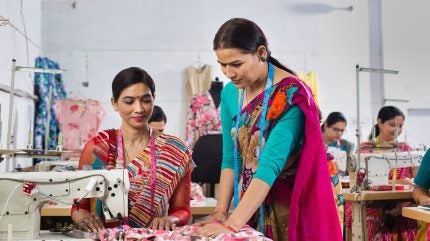
Bharat Tex 2025’s organisers say forecasts show that by 2030, India’s textile industry could grow to a value of $350bn and potentially create 35m new job opportunities.
It adds the sector plays a pivotal role in India’s economy, accounting for 2.3% of GDP and directly employing over 45m individuals, with another 55m engaged indirectly throughout the supply chain. The wide array of products range from traditional handcrafted textiles such as khadi and silk to large-scale garment production and innovative technical textiles, which contribute to the country’s economic progress and international standing.
Aligned with the comprehensive ‘5F’ vision encompassing the entire chain from farm, fibre, fabric, fashion to foreign exports, India maintains an extensive supply network that spans from raw material production to consumer markets while preserving its artisanal heritage.
How India’s textile sector is competing on the world stage
Indian textile manufacturers are attracting international brands and retailers by offering a diverse range of textiles at competitive prices. However, with rapid changes in fashion trends and consumer preferences, Indian companies are expanding their design capabilities and adapting to global market demands by providing versatile product offerings.
The industry’s pivot towards high-value technical textiles serves various sectors including healthcare, automotive, and agriculture, marking a departure from conventional textile manufacturing.
To reduce reliance on cotton and enhance synthetic fibre production — a strategy that has benefited China in dominating global textile exports — India is adjusting its fibre portfolio. This strategic move is further bolstered by the National Technical Textiles Mission (NTTM), which aims to elevate India’s position in the technical textiles arena.
Leveraging government aid and embracing environmental responsibility as a core strategy
Government initiatives have been pivotal in promoting growth within the textile industry. As sustainable sourcing becomes more critical worldwide, Indian enterprises are leading efforts in renewable energy adoption, ethical labour practices, and waste management.
While traditional craftsmanship remains vital to the industry’s identity, technological integration such as automation, computer-aided design (CAD), and cutting-edge manufacturing processes are increasing the need for skilled professionals. Emphasising skill development in rural regions is crucial for cultivating a workforce ready for future challenges.
India’s textile sector is setting global benchmarks through strategic expansion and technological innovation. Embracing man-made fibres (MMF) diversifies India’s raw material base and aligns with key international trends, improving market stability and flexibility.
With an ongoing commitment to research and development (R&D), technology upgrades, strategic alliances, sustainability practices, and circular economy principles, Bharat Tex 2025’s organisers believe India’s textile industry is well-positioned for sustained prominence on the world stage.
Bharat Tex 2025: Seizing international prospects as an agent of transformation
India’s capital, New Delhi, is poised to become the epicentre of the textile industry’s evolution as it prepares to host Bharat Tex 2025, an event that aims to redefine India’s position in the global textile arena.
Scheduled from 12 to 17 February 2025, this event will not only showcase India’s capabilities but also share innovation and sustainable practices within the industry.
Bharat Tex 2025 will occupy 2.2m square feet of exhibition space, accommodating over 5,000 exhibitors and presenting more than 20,000 exhibits.
The event is anticipated to draw more than 6,000 international buyers and 12,000 domestic business visitors from across 110 countries.
It is backed by global and domestic brands such as Aditya Birla, Reliance Industries, Trident Group, and Welspun, with participation from Mafatlal Industries, EM Crafts, and Supreme Nonwoven Industries Private.
Bharat Tex 2025 will feature specialised pavilions tailored to address key industry trends and innovations:
The Sustainability Pavilion will cast a spotlight on the industry’s commitment to environmentally sound practices.
The Start-Up Innovation Pavilion aims to bring forth novel solutions from nascent enterprises.
Craft Museum – Indi bhaat offers a consumer-facing platform that honours India’s rich heritage of traditional arts and crafts.
The pavilions will be enhanced by events, including the International Silk Conference, Better Cotton Annual Meeting, and Innovation Hackathon, all of which are expected to contribute to an environment that fosters networking, collaboration, and growth.
In alignment with the global shift towards sustainability, Bharat Tex 2025 emerges as a pivotal platform for promoting eco-conscious practices within the textile industry. The event is supported by the Ministry of Textiles and organised in collaboration with 11 Export Promotion Councils.
Key themes for Bharat Tex 2025
Sustainable Innovations: The event highlights water-efficient dyeing and organic cotton farming to reduce carbon footprint and resource use.
Circular Economy: It emphasises recycling, upcycling, and closed-loop manufacturing to minimise textile waste.
Ethical Sourcing: The event promotes fair wages, safe working conditions, and transparent supply chains to encourage responsible sourcing.
Sessions like Future of Textiles: ESG & Sustainability and Accelerating Circularity in Indian Textiles will explore strategies for sustainable development. Meanwhile, masterclasses will address practical challenges such as waste management and waterless dyeing processes.
In addition, global entities including the Better Cotton Initiative, UNEP, Laudes Foundation, and corporations like Aditya Birla Group and Arvind are set to share their expertise on scalable sustainability solutions.
Bharat Tex will also offer over 70 knowledge sessions led by renowned partners including KPMG, Gherzi, and NIFT. These sessions aim to provide attendees with critical insights into trade dynamics, investment opportunities, and technological breakthroughs essential for navigating the evolving global market.
The event has garnered support from UN agencies such as UNEP, UNDP, UNESCO, and UNIDO as well as government bodies like Niti Aayog.
In November last year, Bharat Tex 2025 hosted a roadshow in London to promote the country’s textile manufacturing strengths and opportunities.



